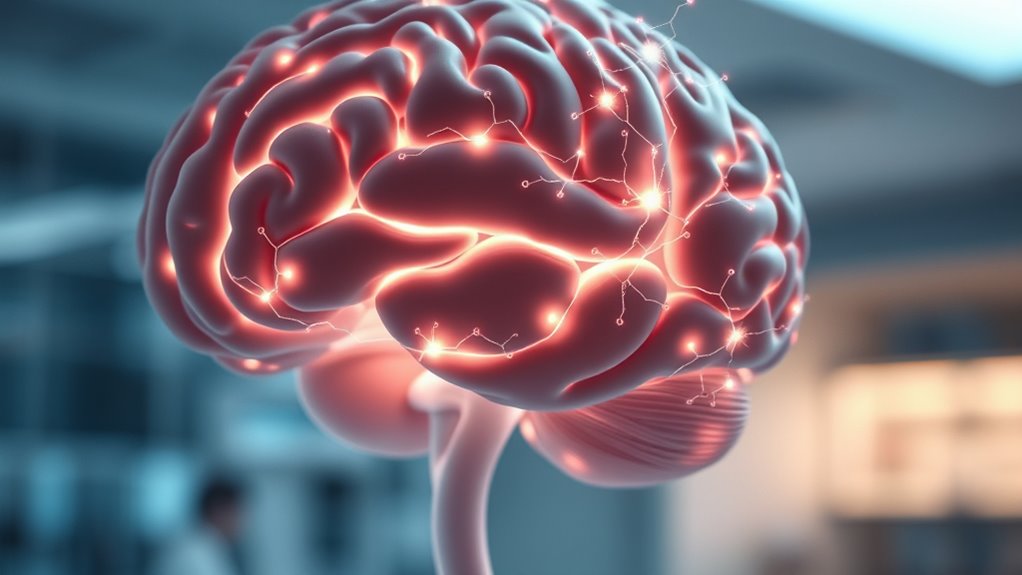Oxytocin, often called the “love hormone,” plays a key role in fostering compassion by boosting social bonding, trust, and emotional connection. Produced in the hypothalamus and released through social activities and touch, it influences brain areas like the amygdala and nucleus accumbens to reduce anxiety and reinforce positive interactions. This hormone also enhances empathy and emotional regulation, making relationships stronger. Keep exploring how this powerful hormone shapes your capacity for compassion and connection.
Key Takeaways
- Oxytocin is a hormone that promotes social bonding, trust, and emotional connection by influencing brain regions like the amygdala and nucleus accumbens.
- It enhances empathy and emotional regulation, reducing social anxiety and fostering compassionate behaviors.
- Physical touch and positive social interactions trigger oxytocin release, strengthening bonds and trust between individuals.
- Oxytocin lowers cortisol levels, decreasing stress and anxiety, which supports emotional resilience and empathy.
- Environmental factors and supportive environments amplify oxytocin’s effects, promoting compassion and social cohesion.
What Is Oxytocin and How Is It Produced?

Oxytocin is a hormone and neuropeptide that plays a crucial role in social bonding, trust, and emotional regulation. It is produced in the hypothalamus and released by the posterior pituitary gland. You might consider oxytocin supplementation to enhance feelings of connection or trust, but its natural production remains essential. In animals, oxytocin influences maternal behaviors, social recognition, and bonding, highlighting its evolutionary importance. When you stimulate oxytocin naturally through touch, bonding activities, or social interactions, you support its release in your brain. Researchers also study oxytocin in animals to understand its effects better and develop potential therapies for social or emotional disorders. Overall, oxytocin’s production and regulation are fundamental to fostering social bonds in both humans and animals. Understanding city dynamics can also help improve social interactions and community integration. Additionally, understanding hormonal regulation can aid in developing strategies to support mental health and emotional well-being. Furthermore, engaging in positive social behaviors can naturally boost oxytocin levels, reinforcing social connections. A deeper knowledge of neuropeptide functions can enhance our comprehension of how hormonal systems influence social behavior.
The Brain Regions Influenced by Oxytocin

Several key areas of the brain are directly influenced by oxytocin, shaping social behaviors and emotional responses. Oxytocin interacts with neurotransmitter systems, modulating signals involved in empathy, trust, and bonding. The amygdala, essential for processing emotions like fear and aggression, is affected by oxytocin, reducing anxiety and promoting prosocial behavior. The hypothalamus, involved in hormonal regulation, helps control oxytocin release and coordinates responses related to social bonding. The nucleus accumbens, associated with reward processing, becomes more active under oxytocin’s influence, reinforcing positive social interactions. Additionally, diverse designs of indoor planters can be used to create calming and inviting spaces that support emotional well-being and social connection. These interactions highlight how oxytocin’s influence on specific brain regions orchestrates complex behaviors, emphasizing its role in fostering compassion and social connection through targeted neural modulation.
Oxytocin’s Role in Social Bonding and Trust

Oxytocin plays a key role in strengthening social bonds and building trust between individuals. When released, it enhances feelings of connection and safety, making cooperation more likely. Understanding how oxytocin influences trust mechanisms and bonding hormone dynamics can reveal much about compassionate behavior. Additionally, research supports that oxytocin’s effects are influenced by individual personality traits, such as emotional intelligence, which can modulate its impact on social interactions. Moreover, the presence of social support systems can amplify oxytocin’s positive effects on fostering trust and empathy among individuals. Recognizing the importance of Cultural Intelligence in social contexts can further deepen our understanding of how hormonal responses are shaped by diverse social environments. The interaction between hormonal responses and social environment is crucial in understanding the full scope of oxytocin’s influence on social cohesion. Furthermore, studies indicate that neurochemical interactions can significantly alter the way oxytocin impacts social behavior across different settings.
Trust Enhancement Mechanisms
Understanding how trust develops between individuals involves exploring the powerful influence of certain hormones on social behavior. Oxytocin plays a key role by enhancing emotional regulation, making it easier to manage feelings like social anxiety. When oxytocin levels increase, you may find it simpler to relax during social interactions, reducing fears of rejection or judgment. This hormone helps you interpret social cues more positively, fostering openness and vulnerability. As a result, trust forms more easily because you’re less hindered by emotional barriers. By promoting feelings of safety and connection, oxytocin acts as a biological facilitator of trust, encouraging cooperation and social bonding. Recognizing this process helps you understand how your body naturally supports trust-building in social relationships. Additionally, engaging in dynamic communication exercises for couples can further strengthen these social bonds by cultivating empathy and active listening skills. Moreover, understanding the hormonal mechanisms involved can aid in developing strategies to enhance social cohesion and emotional intimacy. Insights into cultural adaptations show that social bonding can be influenced by external factors, broadening the scope of trust development strategies. Furthermore, research indicates that external environmental factors can modulate oxytocin release, impacting trust and bonding across different social contexts.
Bonding Hormone Dynamics
Building on how trust is strengthened through emotional regulation, the hormone oxytocin plays a central role in fostering deep social bonds. It influences social cognition by enhancing your ability to interpret others’ emotions and intentions, making interactions more meaningful. When oxytocin levels rise, you feel more connected and trusting, which encourages openness and empathy. This hormone promotes bonding during intimate moments, whether through touch, shared experiences, or vulnerability. By supporting emotional regulation, oxytocin helps you manage your reactions, reducing stress and fostering calmness in social settings. As a result, your relationships deepen, and trust becomes more resilient. Understanding these bonding hormone dynamics reveals how oxytocin naturally reinforces social bonds, facilitating compassionate connections and mutual understanding. Additionally, alarm clocks serve as useful tools to help establish consistent routines that can support emotional stability and well-being.
How Oxytocin Affects Empathy and Compassion

Research shows that this hormone plays a pivotal role in enhancing empathy and compassion. Oxytocin influences neurochemical pathways that regulate social behaviors and emotional responses. When oxytocin is released, it strengthens your ability to understand others’ feelings, promoting emotional regulation and reducing social anxiety. By activating specific brain regions involved in processing social cues, oxytocin helps you respond more sensitively and compassionately. It fosters trust and openness, encouraging you to connect deeply with others’ experiences. This hormone fundamentally acts as a bridge, aligning your emotional state with that of those around you. As a result, oxytocin enhances your capacity for empathy, making compassionate actions more instinctive and genuine. Its influence on neurochemical pathways underscores its essential role in nurturing social bonds and altruism. Additionally, research indicates that automation in business and other technological advancements can impact social behaviors and emotional connections.
Factors That Stimulate Oxytocin Release

Certain activities and social interactions can trigger the release of oxytocin in your body. These moments influence hormonal regulation, prompting your brain to produce more oxytocin. Physical touch, like hugging or holding hands, stimulates its release, reinforcing bonding and trust. Positive social influences, such as compassionate conversations or acts of kindness, also elevate oxytocin levels. Listening to soothing music or engaging in activities that foster connection can further boost its secretion. Your body responds to these stimuli by activating neural pathways that promote social bonding and emotional warmth. Understanding these factors helps you leverage social influences and behaviors to naturally enhance oxytocin production, strengthening your relationships and fostering compassion. Additionally, engaging in safe and supportive environments can further facilitate the release of oxytocin, promoting overall emotional well-being. Research indicates that certain automotive products designed for relaxation or social bonding, like calming music systems or comfort-enhancing accessories, may also indirectly support oxytocin release, benefiting emotional health. For example, electric bikes with smooth rides and comfortable features can create relaxing experiences that contribute to emotional comfort and social connection. Moreover, engaging in modern sneaker culture through stylish and comfortable footwear can foster social interactions and shared experiences that may promote oxytocin secretion.
The Impact of Oxytocin on Human Behavior and Relationships

Oxytocin plays a key role in strengthening bonds and building trust between people. It also helps reduce stress, making social interactions more comfortable. Additionally, higher levels of oxytocin can boost your empathy skills, improving how you connect with others. Incorporating wall organization systems in your home can create a calming environment that supports emotional well-being.
Bonding and Trust
Oxytocin, often called the “love hormone,” plays a crucial role in strengthening bonds and building trust between individuals. When you experience a surge of oxytocin, your emotional regulation improves, making it easier to respond calmly and empathetically. This hormone helps reinforce positive interactions, fostering feelings of safety and connection. Your attachment styles—whether secure or insecure—are influenced by oxytocin levels, shaping how you approach relationships. Higher oxytocin levels promote openness and vulnerability, which deepen bonds. As you bond with others, oxytocin encourages trust, making it easier to rely on and feel secure with loved ones. Overall, this hormone acts as a biological glue, enhancing your capacity for meaningful connections and long-lasting relationships.
Stress Reduction Effects
When you experience a surge of oxytocin, it can considerably reduce stress levels and promote a sense of calm. This hormone enhances your emotional resilience, making it easier to manage stress effectively. Oxytocin influences your body and mind by:
- Lowering cortisol levels, which helps you stay calmer during challenging situations
- Increasing feelings of trust and safety, reducing anxiety
- Promoting social bonding, providing emotional support
- Improving your ability to recover from stressful events faster
Enhancing Empathy Skills
As your understanding of social cues deepens, the influence of oxytocin becomes evident in how it enhances empathy and strengthens relationships. Engaging in empathy training can boost your emotional intelligence, making you more attuned to others’ feelings. Oxytocin plays a key role by increasing your ability to recognize and respond to emotional signals, fostering genuine connections. You can improve your empathy skills through practices like active listening and perspective-taking, which stimulate oxytocin release naturally. As your capacity for empathy grows, so does your ability to build trust and intimacy. This hormonal influence supports more compassionate interactions, helping you navigate social situations with greater sensitivity. Ultimately, understanding oxytocin’s role can empower you to develop deeper, more meaningful relationships.
Recent Discoveries in Oxytocin Research

Recent research has shed new light on oxytocin’s role in fostering social bonding and emotional regulation. Scientists are uncovering how neurochemical interactions involving oxytocin influence behavior and connection. These findings highlight its evolutionary significance, showing how oxytocin helped humans form stronger social groups. Notable recent discoveries include:
- Its effect on reducing stress and anxiety during social interactions
- How oxytocin interacts with other neurotransmitters like dopamine and serotonin
- The genetic variations that influence individual responsiveness to oxytocin
- The potential for targeted therapies to enhance social functioning in conditions like autism
These insights deepen your understanding of oxytocin’s complex role in human evolution and emotional health, emphasizing its importance beyond simple bonding.
Exploring Ways to Naturally Boost Oxytocin Levels

To naturally boost your oxytocin levels, engaging in specific social and physical activities can be highly effective. These activities support hormonal regulation and enhance neurochemical interactions that promote oxytocin release. Physical touch, like hugging or massage, stimulates the release of this hormone through neurochemical interactions in your brain. Spending quality time with loved ones, sharing meaningful conversations, or practicing acts of kindness also triggers oxytocin production. Exercise, especially activities like dancing or yoga, can further support hormonal regulation and boost levels. Additionally, engaging in mindfulness or meditation helps strengthen neurochemical pathways related to oxytocin. By incorporating these habits into your routine, you can naturally elevate oxytocin levels, enhancing feelings of connection, trust, and compassion.
Frequently Asked Questions
Can Oxytocin Be Artificially Administered to Enhance Compassion?
Imagine harnessing compassion like a tool—synthetic administration of oxytocin can potentially boost empathy. However, you should consider ethical considerations, as manipulating hormones raises questions about authenticity and consent. While research explores its use, it’s not yet a reliable or universally accepted method to enhance compassion. You must weigh the benefits against the risks, recognizing that genuine empathy involves more than just hormonal levels.
Are There Any Long-Term Effects of Elevated Oxytocin Levels?
You wonder if elevated oxytocin levels have long-term effects. While short-term benefits include improved social bonds and reduced stress, the long-term impacts are less clear. Elevated oxytocin might influence hormonal regulation over time, potentially affecting emotional and social functioning. However, more research is needed to understand these effects fully. It’s essential to contemplate both the benefits and possible risks before thinking about sustained hormonal changes.
How Does Oxytocin Influence Maternal Behaviors Across Different Species?
You see, oxytocin plays a pivotal role in influencing maternal behaviors across different species through neuroendocrine regulation. It promotes species-specific bonding by enhancing trust and nurturing behaviors, whether in mammals or other animals. Elevated oxytocin levels trigger these maternal responses, supporting offspring care. This hormone’s effects vary among species, but its primary function remains fostering strong maternal bonds essential for offspring survival and development.
Is Oxytocin Linked to Mental Health Disorders Like Anxiety or Depression?
You might think oxytocin’s all about love and bonding, but it’s a bit ironic—this “cuddle hormone” also links to mental health issues like anxiety and depression. Low oxytocin levels can worsen these conditions, yet oxytocin therapy is gaining interest as a potential treatment. While it’s promising, you should remember, it’s not a magic fix, and research is still exploring how best to use it for mental health.
Can Lifestyle Changes Permanently Alter Endogenous Oxytocin Production?
You might wonder if lifestyle changes can permanently alter your body’s endogenous oxytocin production. While lifestyle interventions like regular social interactions, exercise, and stress reduction can boost hormonal regulation temporarily, they may not cause permanent changes. Consistent healthy habits can support ongoing oxytocin levels, but the body’s hormonal regulation remains adaptable, requiring continual effort. Long-term changes depend on sustained behavioral adjustments rather than one-time modifications.
Conclusion
As you learn about oxytocin’s role in compassion, you realize how everyday moments—like a warm hug or heartfelt chat—can unexpectedly boost your levels. It’s almost as if kindness and connection are intertwined, revealing that the more you nurture these bonds, the more they deepen. Sometimes, the simplest gestures open profound emotional responses, reminding you that compassion isn’t just a feeling, but a biological gift quietly shaping your relationships every day.









